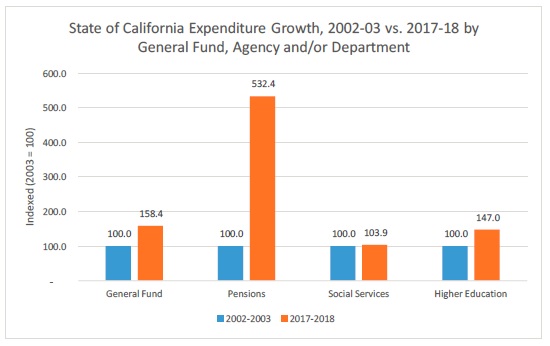Like Schools, Parks, Social Programs? Too Bad, Because Retirees Get Paid First
New report shows how California's pension obligations are crowding out spending on other things.

Increasing pension obligations will slowly strangle schools, parks, and civil services in California. The rest of the country might not be far behind.
As recently as 2003, California's state government paid about $1.3 billion towards the state's two biggest pension funds—CalPERS, which funds retirements for state workers and public safety employees, and CalSTRs for the state's teachers. This year, the state will spend more than $8.7 billion on those two pension funds. By 2030, those annual payments will exceed $19 billion, according to projections in an extensive new report released this week by the Stanford Institute for Economic Policy Research.
Those increasing costs, the Stanford report says, cannot be covered without significant cuts to existing government programs. Because some education spending is fixed under California's Prop 98 rules and public safety funding cannot be cut under other state rules, there are few options other than reductions to other services.
"Pension costs have crowded out and will likely to continue to crowd out resources needed for public assistance, welfare, recreation and libraries, health, public works, other social services, and in some cases, public safety," says Joe Nation, the author of the report and former Democratic member of the California state assembly.
Compounding the state-level pension crisis, local governments are facing similar straits. The Stanford report includes case studies for more than dozen cities, large and small, across California.
In Sacramento, pension costs are projected to hit $150 million by 2023, up from $42 million in 2008. Pension costs have already forced cuts to its cultural programs, neighborhood services, transportation, and police, Nation says. By 2030, the increasing costs will require eliminating $94 million in non-pension spending—equal to a 25 percent reduction in both police and fire expenditures, or 10 percent across-the-board expenditure reductions.

California is in many ways the poster child for America's ongoing public employee retirement crisis, but it is by no means alone. Major cities across the country are facing the same difficult choices.
Using data from Merritt Research Services, Governing Magazine determined that American cities with a population of more than 500,000 spend, on average, about a quarter of their budgets on debt service—including payments to pension system and other so-called "legacy costs" like retired public workers' health care costs. That percentage isn't necessarily concerning, but what's more worrisome "is that legacy costs are rising, taking up ever-larger shares of budgets," writes Mike Maciag, Governing's data editor.
Annual budget outlays for debt payments, pension costs, and other post-employment benefits for cities in Governing's analysis have crept upwards from about 20 percent in 2011 to more than 22 percent in 2016. In some places, the increase has been much greater. "The trend continues to squeeze out other operating expenses over time," Richard Ciccarone, president of Merritt Research, tells the magazine. "Many cities are going to have to increase taxes to retain current levels of services."
Even with the rosiest assumptions, pension costs will continue to rise through at least 2020, warns Moody's Investors Service. State and local governments have more than $4 trillion in retirement debt on their books, the credit rating agency determined in a June analysis. Thomas Aaron, Moody's vice president, says governments will have to increase spending by 17 percent to keep pace with pension costs.
Americans will make do with fewer government services—the silver lining of all this is that increasing budget pressure is a good way to force cuts of wasteful and ineffective programs—but the pension crisis will only reduce the scope of government, not the cost of it.
Editor's Note: As of February 29, 2024, commenting privileges on reason.com posts are limited to Reason Plus subscribers. Past commenters are grandfathered in for a temporary period. Subscribe here to preserve your ability to comment. Your Reason Plus subscription also gives you an ad-free version of reason.com, along with full access to the digital edition and archives of Reason magazine. We request that comments be civil and on-topic. We do not moderate or assume any responsibility for comments, which are owned by the readers who post them. Comments do not represent the views of reason.com or Reason Foundation. We reserve the right to delete any comment and ban commenters for any reason at any time. Comments may only be edited within 5 minutes of posting. Report abuses.
Please to post comments


I'm pretty sure talking about cutting first responder pensions is considered a hate crime now.
Fortunately I answered "no" on all the title questions.
Haha, same. Schools can be good, but the other two are easy to give up.
Schools can be good, but the vast, vast majority of them are not.
Back in the good old days, widespread child labor both cost us all less AND contributed to GDP!
A while back, I listened to Mike Duncan's French Revolution podcast. His description of the ancien regime that predated the revolution sounded a lot like the situation you're describing here. Lots of overlapping entities with multiple claims on the incomes of workers and peasants via taxation and tithes, a useless national government that squandered the wealth of the nation on wars and monuments to itself, and a smug ruling elite that despised the populace as deplorables.
That is a great podcast.
Also, the separate set of accounting for "required" spending versus spending that was actually required for the king was awesome.
However, there is nothing to worry about in California. By increasing their tax rates, mandating all-electric cars, and building out their high-speed rail projects, California will create so much wealth that the pension fund shortfalls will seem like chump change. That seems to be the theory, at least.
Their high-speed choo-choo in the valley will generate billions itself.
billions of what?
Billions of tax credits.
As long as The Big One strikes before the bill comes due, it'll become the Mole People's problem!
Even odds that the next Democratic president appeases blue states and cities with a massive pension bail out. The public employee unions will mau-mau him or her into it during the campaign.
Hell, even odds Republican president will do it.
Like this?
Puerto Rico bonds plunge after Trump pledge to wipe out debt
It can't be a coincidence that a chart of California's expenditures is giving us the finger...
I love how public sector unions are whining about how they were promised a benefit on the backs of taxpayers that virtually no tax payers actually receive themselves. When was the last time you saw a job opening that provided a pension, one might wonder.
Why are 'public' employees so much more deserving than the people they 'serve'? Hell, most of them get to retire way before a private sector employee, and they can draw that pension while working some other job. I say slash their shit and be done with it. No one can afford to pay people not to work. Not even the FedGov.
Obviously the solution is a 90% tax on state pensions. Must I think of *everything*?
Good idea.
Maybe convict all public employees in California of conspiracy to violate the constitutional rights of everybody else?
One look at the pension overruns should be enough to convict them all on a RICO charge.
I've been reading a lot of Jane Jacobs (and listening to a lot of Strong Towns) lately, and I'm sold on the idea that large metropolitan cities are the ideal unit of governance. Whatever happens with the state and local governments of these bankrupt jurisdictions, I hope that they're rebuilt through local control. I've been hearing a lot more noise about federalism from the progressive New Urbanism front than I have conservatives (with some exceptions; the New Urbs section of The American Conservative is pretty great). I think it's finally clicking with progressives that if they want control of their lives without the Trumpalo troglodytes having a say, they need their cities to be independent and self-sustaining.
I'm not convinced that progressives understand what the phrase 'self-sustaining' actually means though.
Yeah, I think their "self-sustaining" tends to end at infrastructure and local services; things like universal health insurance and basic income are still expected at the state-level or higher. But I think there's a lot to like in the New Urbanism movement. The Atlantic's CityLab editor Richard Florida - not at all a small government guy - has been advocating for cities to balance their own budgets and remove housing restrictions, and has acknowledged that progressive cities will have to shoulder a lot more of the load if they want the services they advocate for. And he isn't immediately dismissive of Trump voters, unlike most of his academic colleagues.
Not following you here.
Are you saying that rural areas don't need governance? Or are you saying that metros should get to govern rural areas? (We already have the latter.)
Not that rural areas don't need governance, but that they don't need the same governance as cities. I don't think rural areas should govern urban areas and vice versa. I'm even skeptical of suburbs being governed by cities.
A lot of metros - I would say any U.S. metro over 1 million people - probably have enough size and economic diversity to run themselves. Jane Jacobs' "Cities and the Wealth of Nations" (she liked Adam Smith's work, though she disagreed with his emphasis on specialization and division of labor) discusses the suitability of cities as the primary economic unit, not nation-states.
Personally, I care a lot more about my city than I do my state, and far more than I do about my country. All the night-watchman policies I want of a minimalist government can be performed at a local level. And all my proggie "bike lane on every street" desires can be fulfilled without bothering the rural folk.
Start your home business right now. Spend more time with your family and earn. Start bringing 55$/hour just on a computer. Very easy way to make your life happy and earning continuously. Start her>>>
http://www.webcash20.com
Sigh; California again.
So secede already, and take Hawaii with you.
Form the nation of Pacifica.
Print all the money you need for parks & pensions.
No worries.
What's the wager on how long before states like Texas have to institute income taxes that simply get funneled to California so that no one actually recognizes the shit storm California created?
"the silver lining of all this is that increasing budget pressure is a good way to force cuts of wasteful and ineffective programs"
The city of Milwaukee is cutting the police and fire departments. The mayor was re-elected 70-30, and the only credible opponents are Socialists to his Left.
??????O
just before I saw the paycheck which was of $9068 , I did not believe ?that?my father in law was like they say actually taking home money in there spare time on their computer. . there brothers friend haze done this for less than seven months and at present paid the loans on there apartment .. .??????? ?????____BIG?..EARN?.MONEY..___???????-
California is also pretty special in their stupid shortsighted rules that are easy to game by spiking your salary at the end with overtime. Those assholes are deliberately and cynically draining the state, it isn't just the usual pyramid scheme winding down due to demographics.
Like Schools, Parks, Social Programs?
No.
Like Schools, Parks, Social Programs? Too Bad, Because Retirees Get Paid First - Hit & Run : Reason.comis the best post by imo for pc Please visit imo app imo app snaptube for pc snaptube app